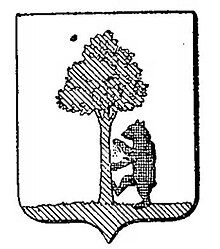Salinis family
| Salinis family | |
|---|---|
 | |
| Current region | Salies, Morlaàs - Béarn |
| Titles |
|
| Motto | Sic sale vivesco |
| Estate(s) | Château noble of Salies, Seigneury of Gers, Vicomté of Saderac, Noble land of Lème |
The Salinis family, descended from the Salies family, is a noble house established in Béarn since the Ancien Régime.
Origins
[edit]Establishment in Salies-en-Béarn
[edit]The Salinis or Salies family consists of two branches of the same lineage. It originated in the town of Salies in Béarn.[1] This tradition is confirmed by a hereditary right to the saline fountain in Salies-de-Béarn, enjoyed by the elder branch until its extinction. In 1821, Charles and Antoine de Salinis authored a report for the Administrative Commission of the Saline Fountain in Salies, requesting their inclusion in the distribution of its waters. This resource was managed by the Corporation of "Part-Prenants" since 1587, governed by egalitarian customs based on territorial and hereditary rights[2][3] · .[4] The commission ruled in favor of the Salinis family on May 3, 1823.
Salies and Salinis: One Family
[edit]The name "Salinis" derives from "Salies". In Béarn, it was customary for cadet branches of a family to Latinize their name's ending to distinguish themselves from the senior branch. The cadet branch thrived while the elder branch became extinct.[5]
A Noble Family
[edit]In Béarn, nobility was determined by land ownership rather than lineage. Noble status could be acquired by purchasing noble land or receiving it as a fief in exchange for service or an oath.[6] Members of this family held prominent positions "in the Church, the military, and the judiciary".[7]
Notable Members
[edit]- Gallard or Guilelmus de Salies, Bishop of Dax (1215–1234).[8]
- Arnauld V, Bishop of Lescar in 1427.[8]
- Jean Duhau de Salies, Bishop of Lescar (1658–1681), who swore allegiance to the king in 1659.[8]
- Louis-Antoine de Salinis, theorist of "common sense," Bishop of Amiens, and Archbishop of Auch.[9]
Coat of Arms
[edit]The Salinis family's arms bear similarities to those of Salies town, featuring a natural bear climbing a green beech tree and scattering salt. Their motto is "Sic sale vivesco" ("Thus I thrive with salt").[10]
References
[edit]- ^ Régis de Saint-Jouan 1952, p. 301.
- ^ Picamilh 1858, p. 539–541.
- ^ "Les Part-Prenants de Salies-de-Béarn : un exemple d'avant-garde sociale et économique". Agence d’attractivité et de Développement Touristiques Béarn Pays basque. Retrieved January 4, 2025.
- ^ Bely, Romain (December 26, 2011). "Ils détiennent l'or blanc de Salies-de-Béarn". Sud Ouest. Retrieved January 4, 2025.
- ^ Régis de Saint-Jouan 1952, p. 302.
- ^ Mailhol 1895–1897, p. 695.
- ^ Saint-Allais 1872–1878, p. 214.
- ^ a b c Ladoue 1873, p. 466.
- ^ Saint-Allais 1872–1878, p. 215.
- ^ Ladoue 1873, p. 467.
Bibliography
[edit]- Ladoue, Casimir de (1873). Vie de Mgr de Salinis. Tolra. Retrieved January 4, 2025.
- Picamilh, Charles de (1858). "Salies ou Salinis (de)". Statistique des Basses-Pyrénées. Vol. 1. pp. 538–547. Retrieved 2025-01-04.
- Régis de Saint-Jouan (1952). Le nom de famille en Béarn et ses origines. Revue internationale d'onomastique. doi:10.3406/rio.1952.1297. Retrieved January 4, 2025.
- Mailhol, Camille Philippe Dayre de (1895–1897). Dictionnaire historique et héraldique de la noblesse française. Retrieved January 4, 2025.
- Saint-Allais, Nicolas Viton de (1872–1878). Nobiliaire universel de France, ou Recueil général des généalogies historiques des maisons nobles de ce royaume , Recueil général des généalies historiques des maisons nobles de ce royaume. Vol. 8. Paris: Bachelin-Deflorenne.
